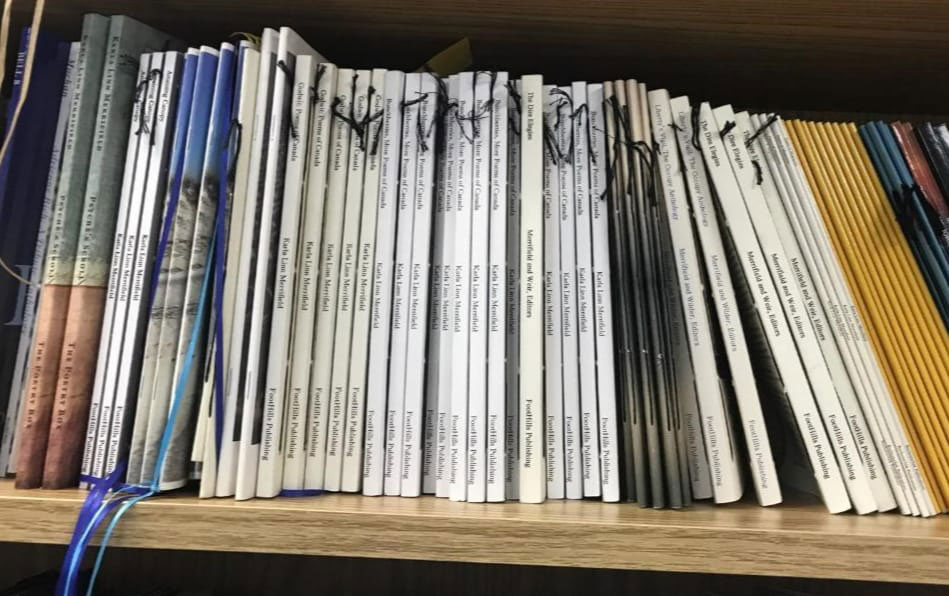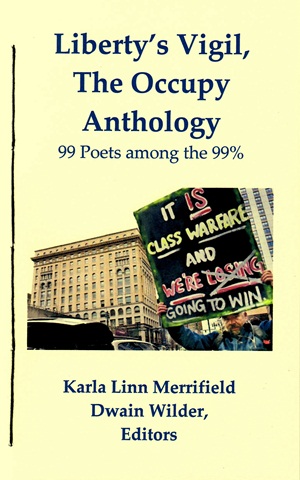Liberty’s Vigil, The Occupy Anthology: 99 Poets among the 99%
Co-edited with Dwain Wilder
Published by FootHills Publishing, 2012
DESCRIPTION
Ninety-nine poets from 22 states and 6 countries speak out on behalf of the 99%, encouraging their fellow citizens to join in the effort to end corporate excess and income inequality, and win back the middle-class from corporate titans and their political puppets.
Co-editors Karla Linn Merrifield and Dwain Wilder have assembled the first anthology of its type in the world to inspire readers to take action on behalf of the 99%.
“Poets here have left their quiet corners and hit the streets to encourage their neighbors to address the needs of the homeless…to fight side by side with besieged homeowners who are facing foreclosure…to eliminate corporate ‘personhood’ and inordinate corporate influence on Capital Hill. We want readers to learn; we want them to act,” said Merrifield, author of six books of poetry.
In a similar vein, co-editor Dwain Wilder remarked, “I have very much enjoyed having a part to play in this collection’s coming together. It is to be hoped that this will not be just a poetic artifact of historic interest (which I certainly hope it will!), but that it will also be the start of yet another breath taken by Americans on their long, vigilant road toward fully realizing our national dream of freedom, liberty and justice for all.”
An historic book
Contributing poet Chris Crittenden of Lubec, ME, remarked on the historical nature of the anthology, saying: “The Wall Street debacle of 2008 is the blow that broke the weakened backbone of American supremacy. Ninety-nine voices within these hand-sewn pages capture the outrage, shame and anguish of a vast potential squandered. They embody the wounded consciousness of a fractured and dismayed citizenry, and their howls, laments, and torn dithyrambs shall fascinate historians a thousand years from now as much as they stab us today.”
Diverse Voices, Diverse Styles
“Poetry wields a special force in the Occupy movement. It is a medium that comes from the deep roots of our subconscious, in a myriad of styles, to focus attention on social injustice and political tyranny. Occupy poetry gives voice to the voiceless and unites the movement with a river of words and a fire of images. That is, ‘a posse ad esse’…from possibility to actuality,” says contributing poet Devreaux Baker. And myriad is a key word.
Humor and rage, compassion and irony and so much more! Liberty’s Vigil, The Occupy Anthology may have a single unifying theme, but its poets represent a wide range of viewpoints and styles. You’ll find in the book’s pages distinguished poetic masters such as William Heyen and Francisco X. Alarcón as well as poets just launching their careers. And, the 99 poets’ styles range from free verse to tanka to villanelle to sestina to…. Here’s Elizabeth Bodien‘s contribution:
Tanka: as winter bites
as winter bites
the fraying jacket rips
how to mend?
a few own all the needles, thread
the rest only their voices
And here’s an excerpt from Bill Dorris’s “The EU Commissions a Group Portrait by Van Gogh:”
We want something that captures the essential humanity
of a high-yield market,
that shows the lives we have previously revoked
are merely subject to default….

FROM THE EDITORS
Or Forever Hold Your Peace
I believe it’s true: Poets are the world’s most experienced decision-makers.
Because words matter so very much, every day poets first make the all-important decision: To pick up the pen, to write. Then, we make dozens of decisions as we write each poem. We decide on the topics of our poems: tyranny, violence, greed…. We decide on verbs: protest, occupy, change. We decide on line breaks and stanza breaks, thus: “So much depends/ on weather/ and the thin / quality/ of mercy.” We decide which images to use: “as winter bites/ the fraying jacket rips” will depict homelessness. We decide on appropriate figures of speech: “the money lenders sip bubbly/ and nap like Persian cats.” We make a hundred more decisions as we revise: Delete “begging;” replace with “pleading.” We decide to title our poems: “Unemployed,” “Bread Not Bombs,” “The EU Commissions a Group Portrait by Van Gogh.” And every day poets who are editors decide to publish our decision-laden poems.
On the night I first listened to “The Tides Are Turning,” Roger Waters’s stirring anthem of the Occupy Movement, I felt “warmed to the sight of a billion candles burning.” His poetic words warmed my entire being, and I made the decision: This anthology had to be. And the very next day poet Dwain Wilder decided to join me in the endeavor as co-editor. And three days later poet Michael Czarnecki decided FootHills Publishing would produce the collection. And soon poets around the world decided to send forth their poems to be considered for Liberty’s Vigil-because they had decided it’s time to change the world.
As 99 of our world’s most-important decision-makers (from 22 states and six countries), all poets assembled herein, occupying this book by virtue of our poems, invite you to make your most-important decision: to join us and occupy the Earth with hope for a better world.
Thank you, fellow poets; thank you, readers.
— Karla Linn Merrifield
Poetry While It’s Hot
The challenge for public poetry in such a moment as we find ourselves, literally occupying the places of corrupt power and calling it by its true name, is well stated by Paul the Apostle to be “in the world but not of the world.” If as poets we aspire to “speak truth to power,” to use the well-regarded and felicitous phrase, we must somehow see public action and speech as tropes, figures of the many expressions of the human condition.
Thus poetry, while not quite rising above the fury of the moment, does more than simply repeat, interpret, enjoin or enter the battle. Here, poets have an opportunity to show us, and themselves, the deeper human meaning of the incidents which we find so moving – or repellent – meaning that is far deeper than words yet indicated, somehow, by words. To do so in the thick of the fray requires great presence of mind in addition to artistic control of speech – a peculiarly intimate medium for art, akin to music.
It is delightful to see so many rise to this occasion. Gratitude also to those many who sent fine entries, but could not be fitted within these pages.
— Dwain Wilder




